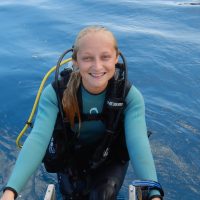Pauline Narvaez
PhD candidate
James Cook University
@https://twitter.com/pauline_narvaez

From 2005 to 2022, the main node of the ARC Centre of Excellence for Coral Reef Studies was headquartered at James Cook University in Townsville, Queensland (Australia)








Pauline Narvaez grew up in the South of France in a small town close to the Mediterranean Sea. Her passion for the ocean started with the Cousteau’s movies and books and she was persuaded that one day, she will also be able to discover the oceans. It is why, after having completed a Bachelor Degree at the Universite Paul Sabatier in Ecology in Toulouse (France), she travelled to Lisbon (Portugal) in 2011 to complete her Master Degree in Marine Ecology. For her master thesis, she studied cleaner fish behaviour and fish ectoparasites in the Northeastern Atlantic (Azores Archipelago). From 2014-2015 she took part in several scientific projects and travelled to several countries (Portugal, The Bahamas and Brazil) that helped her to build scientific collaborations in the area of marine fish and parasite ecology. By late 2016 and throughout 2017, she had the opportunity to participate in several extended field trips to the Great Barrier Reef (Lizard Island Research Station, Australia) examining the relationship between ectoparasites, their fish hosts and cleaner fish with Dr Alexandra Grutter (University of Queensland) and Dr Paul Sikkel (Arkansas State University). From March to June 2017, she volunteered in the Marine Parasitology Laboratory at James Cook University, where she took part in various experiments. Now, Pauline will pursue her research interests in cleaner organisms and ectoparasites ecology for her PhD, supervised by Dr Jennifer Donelson and Dr Kate Hutson.
Pauline Twitter & ResearchGate
New DNA techniques are being used to understand how coral reacted to the end of the last ice age in order to better predict how they will cope with current changes to the climate. James Cook Univer
A new study on the effects of climate change in five tropical countries has found fisheries are in more trouble than agriculture, and poor people are in the most danger. Distinguished Profess
James Cook University researchers have found brightly coloured fish are becoming increasingly rare as coral declines, with the phenomenon likely to get worse in the future. Christopher Hemingson, a
Researchers working with stakeholders in the Great Barrier Reef region have come up with ideas on how groups responsible for looking after the reef can operate more effectively when the next bleaching
Abstract: As marine species adapt to climate change, their heat tolerance will likely be under strong selection. Individual variation in heat tolerance and its heritability underpin the potential fo
Abstract: The Reef Ecology Lab in KAUST’s Red Sea Research Center explores many aspects of movement ecology of marine organisms, ranging from adult migrations to intergenerational larval dispersal
Abstract: Macroalgal meadows are a prominent, yet often maligned component of the tropical seascape. Our work at Ningaloo reef in WA demonstrate that canopy forming macroalgae provide habitat for ad
Abstract: Sharks are generally perceived as strong and fearsome animals. With fossils dating back at least 420 million years, sharks are not only majestic top predators but they also outlived dinosa
Abstract: Connectivity plays a vital role in many ecosystems through its effects on fundamental ecological and evolutionary processes. Its consequences for populations and metapopulations have been
Abstract: Evolution of many eukaryotic organisms is affected by interactions with microbes. Microbial symbioses can ultimately reflect host’s diet, habitat range, and even body shape. However, how
Abstract: The past few years have seen unprecedented coral bleaching and mortality on the Great Barrier Reef (GBR) but the consequences of this on biodiversity are not yet known. This talk will expl